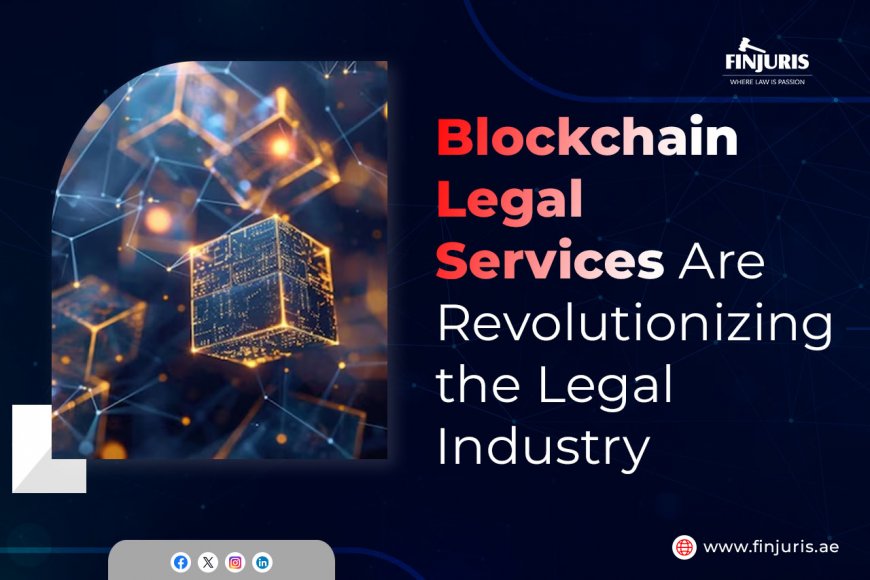Blockchain Legal Services Are Revolutionizing the Legal Industry
Learn how blockchain legal services are revolutionizing the legal industry. Discover the impact of blockchain technology on transparency, security, and efficiency in legal processes.

In the ever-changing environment of technology and industry, blockchain has emerged as a transformational force with far-reaching consequences across several industries. Legal services are one sector where it is having an increasing influence. Blockchain technology, originally developed as the underlying structure for cryptocurrencies such as Bitcoin, has evolved beyond its original purpose and is now used to improve legal procedures' efficiency, transparency, and security. This article explores the convergence of blockchain and blockchain legal services, including its potential, existing uses, regulatory hurdles, and future prospects.
Understanding Blockchain Technology
Blockchain may be defined as a decentralized and distributed ledger that records transactions via a network of computers. Each transaction, or "block," is cryptographically connected to the preceding one, resulting in a chronological chain of blocks. This structure assures transparency and immutability, as changing any one block requires the consensus of the whole network, making it very resistant to manipulation and fraud.
Current Applications in Legal Services
Smart Contracts
One of the most important uses of blockchain in the legal arena is smart contracts. Smart contracts are self-executing contracts in which the terms of the agreement are encoded directly into code. They execute and enforce themselves when preset circumstances are satisfied, eliminating the need for middlemen. This automation lowers the chance of mistakes and manipulation, speeds contract execution, and builds confidence between parties.
Smart contracts have applicability in a variety of legal circumstances, including:
Supply Chain Management: automating payments and guaranteeing contractual compliance.
Real Estate: Real estate services include facilitating property transfers and securely maintaining escrow accounts.
Intellectual Property: Intellectual property involves automating royalty payments and monitoring license agreements.
Legal ID Verification
Blockchain technology can enhance identity verification by generating immutable digital IDs. This can simplify client onboarding for legal firms, improve document security, and lower the risk of identity fraud.
Evidence and Chain of Custody
Blockchain's tamper-proof nature makes it suitable for establishing a transparent and verifiable chain of custody for evidence. This is especially valuable in litigation and intellectual property issues, where demonstrating the authenticity and integrity of evidence is critical.
Enhancing Legal Operations
Streamlining Due Diligence Procedures: Blockchain makes due diligence operations quicker and more effective by offering a secure platform for validating the validity of documents and transactions. This saves time and resources spent on manual verification, allowing legal practitioners to focus on other important responsibilities.
Dispute Resolution and Arbitration: Blockchain technology can provide more transparent and efficient dispute resolution procedures. By providing immutable recordings of agreements and transactions, it eliminates contract term disputes and improves the enforcement of arbitration awards.
Intellectual Property Right Management: Blockchain technology has the potential to alter the administration of intellectual property (IP) rights by securely documenting ownership, transfers, and license agreements. This lowers ownership issues and allows for speedier settlement of intellectual property infringement cases.
Role of Lawyers in Blockchain Legal Services
Lawyers play an important role in the blockchain business, providing a variety of specialized legal services to help blockchain enterprises negotiate the complicated regulatory landscape, maintain compliance, and accelerate their growth. This article delves into the unique services that attorneys give to blockchain firms, the regulatory hurdles they face, and the strategic advice they provide to promote innovation and growth in this dynamic field.
Legal Services for Blockchain Firms
Regulatory Compliance and Guidance:
Blockchain companies operate in a highly regulated environment, negotiating regulatory frameworks that are constantly expanding to accommodate decentralized technology. Lawyers that specialize in blockchain provide vital services like:
Regulatory Compliance: Guiding regulatory requirements for cryptocurrencies, token offerings (ICOs/STOs), anti-money laundering (AML) legislation, securities laws, and data protection.
Navigating Jurisdictional Issues: Offering advice on international rules and jurisdictional concerns for cross-border transactions and activities.
Structure of Token Offerings:
To comply with securities laws and regulatory requirements, token offers must be carefully structured, whether they are Initial Coin offers (ICOs), Security Token Offerings (STOs), or other types of token sales. Lawyers help blockchain companies by
Drafting Legal Documentation: Creating white papers, conditions of sale, token purchase agreements, and other legal documents necessary for token sales.
Compliance Review: Conducting legal due diligence to ensure that token sales follow applicable securities rules and investor protection legislation.
Smart Contract Audits and Legal Reviews:
Smart contracts are the backbone of many blockchain applications, managing automated transactions and agreements. Lawyers that specialize in blockchain technology provide services such as:
Smart Contract Audits: Examine smart contract code for security flaws, functionality, and legal compliance.
Legal review of smart contracts: Ensure that smart contract terms comply with legal duties and are enforceable under applicable laws.
Intellectual Property Protection:
Blockchain companies frequently create breakthrough technology and protocols that require intellectual property (IP) protection. Legal services in this field include:
Patent and Trademark Filings: We file patent applications for blockchain breakthroughs and register trademarks to safeguard brand identities.
IP license and Agreements: Creating license agreements for blockchain technology, software, and protocols to aid commercialization and collaboration.
Dispute Resolution & Litigation:
Even though blockchain is decentralized and transparent, contract breaches, token ownership, and regulatory compliance may all lead to conflicts. Lawyers offer services such as:
Dispute Resolution: Provide mediation, arbitration, or negotiation services to resolve issues efficiently and cost-effectively.
Litigation Support: Litigation support includes representing blockchain companies in court processes and regulatory inquiries, advocating for their interests, and fighting against accusations.
Data Privacy and Cybersecurity:
Blockchain organizations manage massive volumes of sensitive data, necessitating stringent data privacy and cybersecurity safeguards. Legal services in this field include:
Data Protection Compliance: Providing advice on how to comply with data protection laws and regulations such as GDPR, CCPA, and other worldwide standards.
Cybersecurity Incident Response: Creating and implementing response strategies for data breaches and cybersecurity events in order to reduce legal and reputational concerns.
Regulatory Challenges
While blockchain has several benefits for the legal profession, its implementation is not without hurdles, notably in terms of regulatory compliance and legal norms.
Data Privacy and Security: Ensuring compliance with data protection requirements while retaining the transparency and security benefits of blockchain.
Smart Contract Enforceability: Legal frameworks must evolve to identify and enforce smart contracts, which run autonomously using preset code.
Cross-Border Regulations: Blockchain works across boundaries, creating concerns about sovereignty and international regulatory harmonization.
Future Outlook
The future of blockchain legal services appears optimistic, however with significant uncertainties:
Increased Adoption: As public knowledge and comprehension of blockchain technology grows, more law firms and legal departments are likely to use blockchain solutions to improve their operations.
Standardization and compatibility: Efforts are underway to define blockchain technology standards and assure compatibility among different blockchain systems, allowing for greater adoption and integration.
Regulatory Clarity: Regulatory frameworks will adapt to handle the particular issues presented by blockchain technology, combining innovation with consumer protection and legal clarity.
In conclusion, Blockchain technology promises a paradigm change in the legal business, providing innovative answers to long-standing issues including inefficiency, lack of transparency, and security risks. While there are legislative and technological challenges to solve, blockchain has the potential to significantly improve legal services. As stakeholders work together to overcome these obstacles and realize the full potential of blockchain technology and blockchain legal services, the legal profession is set for a digital transformation that offers increased efficiency, transparency, and accessibility for both clients and practitioners.
What's Your Reaction?




















